Looking Back at the 2024 World of Modular
On March 18-21, the Modular Building Institute presented its 41st annual convention and tradeshow, hosted again at the luxurious the Rosen Shingle Creek in Orlando, FL. Nearly 1,500 attendees from around the world gathered to learn, network, and find ways to expand both their businesses and the industry at-large.
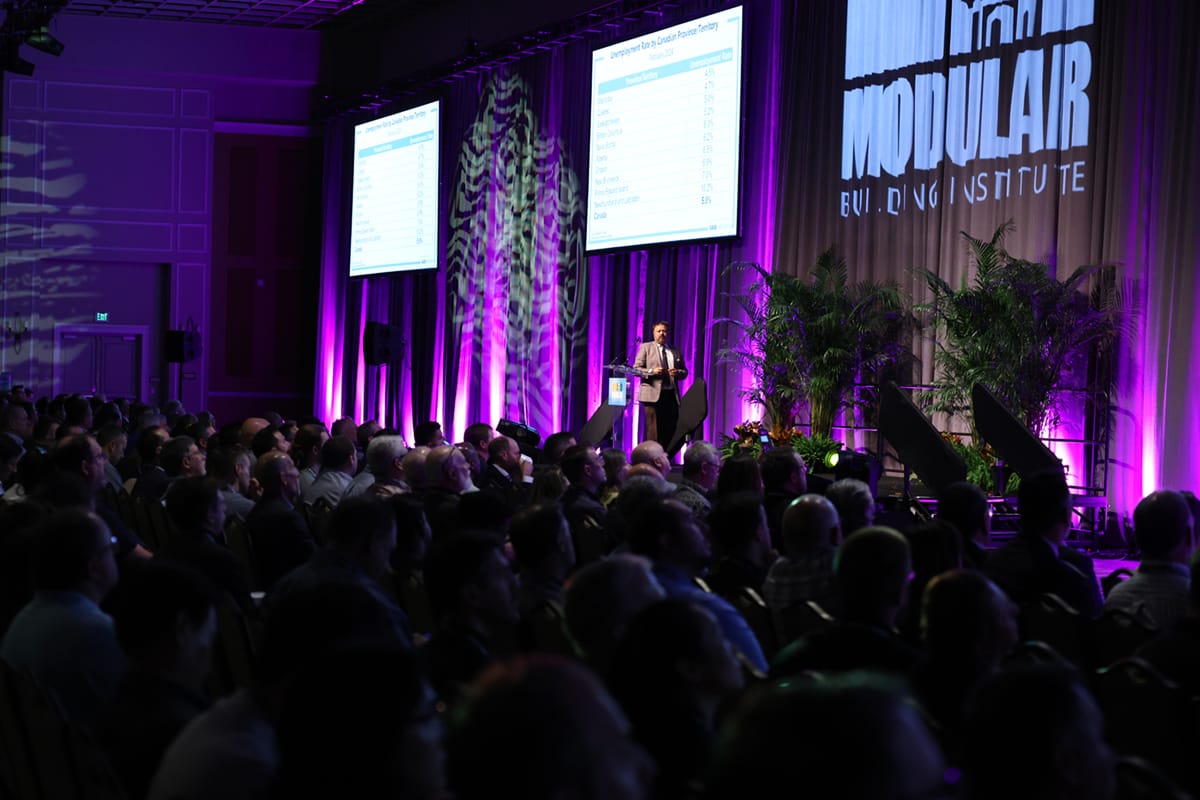
Anirban Basu, CEO & Founder of Sage Policy Group, Inc. and chief economist of the Modular Building Institute, presented the conference’s opening keynote address.
The 2024 World of Modular (WOM) began in earnest on the evening of March 18 with the smooth sounds of Jimmy Buffet, played by tribute band Caribbean Chillers. To match the music, attendees wore Hawaiian clothes and received leis. MBI Executive Director Tom Hardiman spoke briefly and encouraged attendees to take advantage of the opportunities at World of Modular, citing that several deals had been made at previous conferences. With nearly 1,500 attendees, there would be plenty of opportunities.
Building the Future of Modular Construction
Day two started with an emphasis on the future of construction, and specifically modular construction. In his opening address, Hardiman assured attendees that MBI was focusing its resources on the critical issues of the day, including the shortage of skilled labor.
Hardiman also spoke about the recent launch of MBI’s Modular Advocacy Program (MAP), a multiyear, multimillion-dollar campaign to spur investment and increase adoption of modular construction. Its main goals include industry advocacy, providing new business opportunities, and workforce development. Attendees were encouraged to donate to this program by purchasing MBI Seals, sponsorship, or donating directly to the program.
Keynote speaker Anirban Basu, chairman and CEO of Sage Policy Group and MBI’s chief economist, then took the stage and spoke about economic trends within the construction industry. He expects construction to be busy in the short term, with a recession predicted later in the year. He noted the industry is still suffering from a severe labor shortage, with 400,000 open construction jobs and 500,000 open manufacturing jobs as of January 2024. In February, 275,000 new jobs were created in the industry.
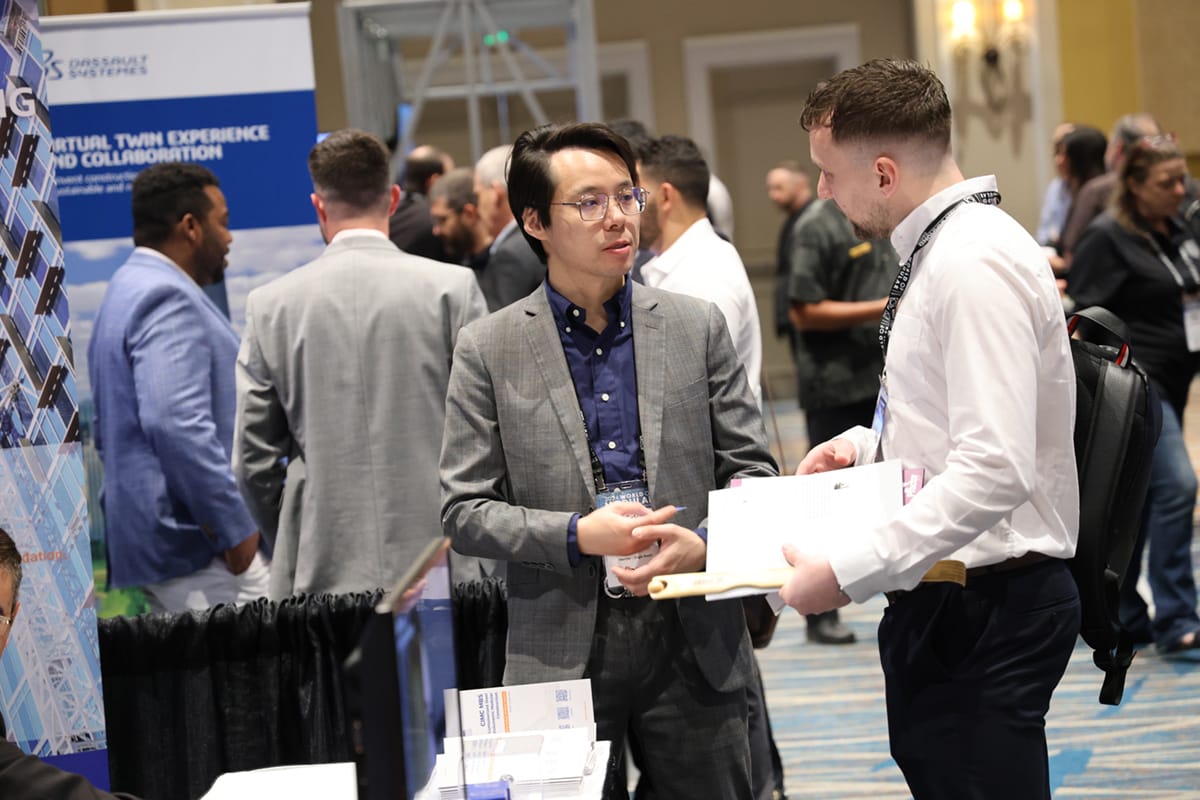
The 2024 World of Modular exhibit hall—one of the conference’s best opportunities for networking and business development—featured more booths than ever before.
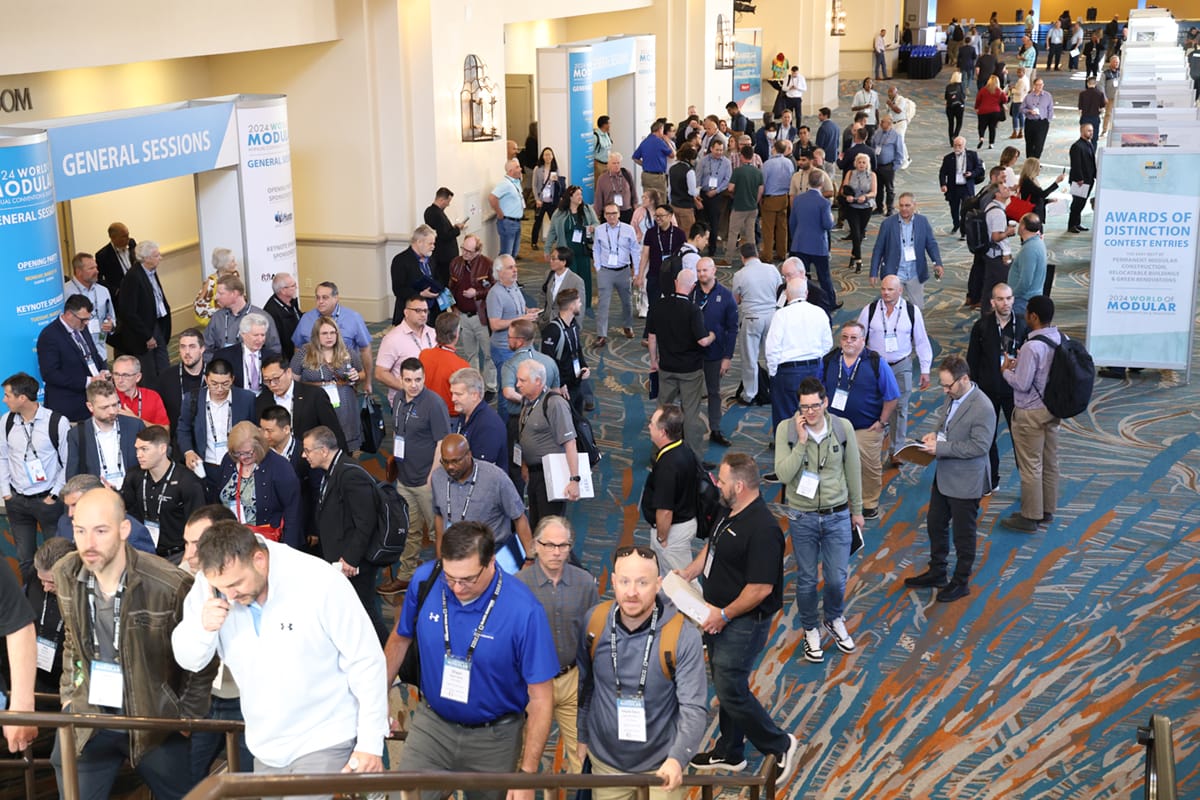
The general session crowd begins to funnel toward the many available breakout sessions.
Making Connections to Address the Worker Shortage
To help address this shortage, MBI worked with Momentum Innovation Group to introduce a new feature at WOM, the Workforce Development Lounge. At the lounge, attendees could attend presentations or just walk in and start a conversation about the newest approaches to solving this crisis.
On one afternoon, a general contractor from California walked in and spoke with MBI’s new professional and workforce development director, Heather Packard. He told her he had customers requesting modular construction and he came to the conference to learn how to implement it into his business. In a separate conversation, Packard heard about a new architecture school being provided by Wilmot Modular in an attempt to attract more designers to modular. Attendees were encouraged to share local programs and what was working for them so others could learn.
Education and Best Practices
A variety of learning sessions were provided throughout the conference. There were case studies on specific projects where attendees could ask questions and learn from the successes and challenges of others. For example, Jeremy Zimman of Holon Modular Building Systems shared his company’s success with its Jindu Residential Tower project in China, where it placed modules for 26 stories of housing in just five days.
In another session, a panel of five women, industry leaders all, provided insight on the impact women could have in modular construction. One of the panelists, Sara-Ann Logan, AIA, Vice President of Design at Volumetric Building Companies, recalled, “It was about how can you be a woman in manufacturing and a woman in construction and the challenges that we’ve faced. It was a pretty moving time. To see the room full and a lot of men there supporting us…it was really heartwarming.”
National Renewable Energy Laboratory representatives Julia Sullivan and Shanti Pless presented preliminary findings on their recent research on the use of robots and artificial intelligence to speed up productivity and address labor shortages.
“I know it sounds cliché,” said Geoff Baker, VP of Strategy at Stack Modular, “but the amount of knowledge you can gain is substantial. If you can gain one little one little tidbit of knowledge that you can take and you can leverage in your own business, it’s worth the entire trip.”
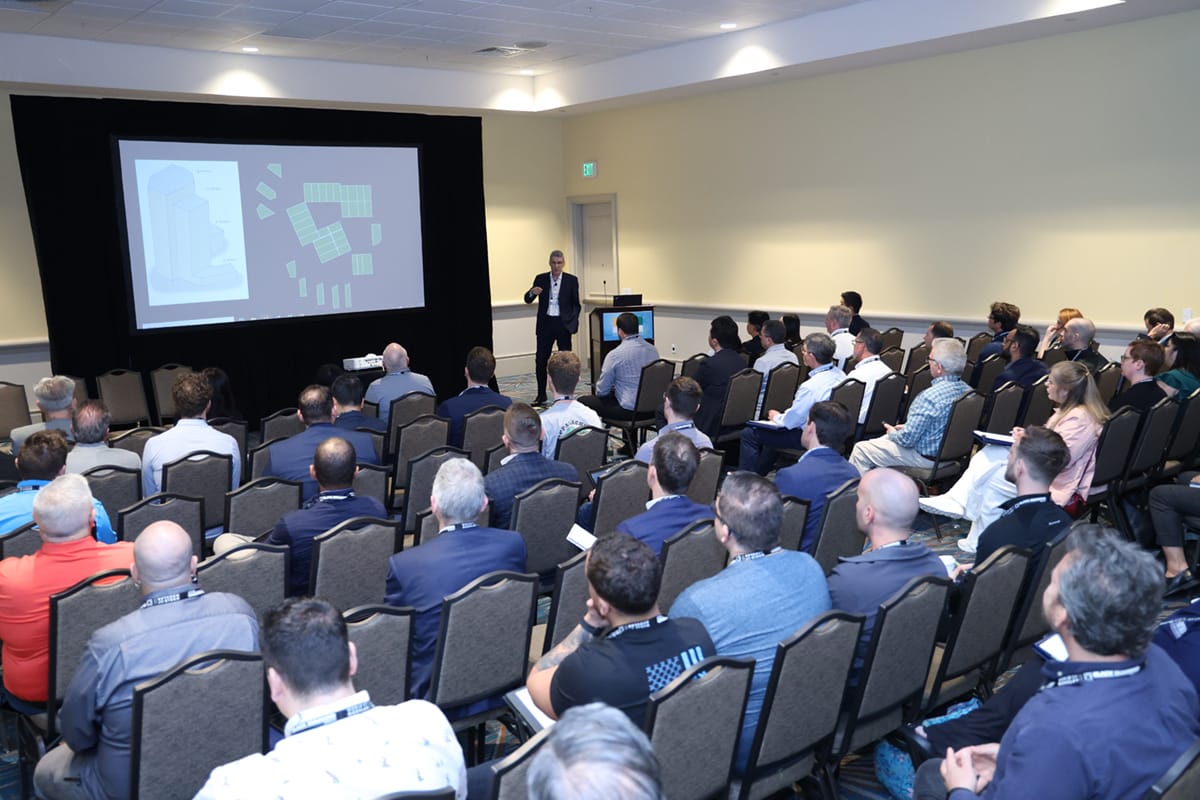
Michael Hough, founder of MJH Structural Engineers, described the efficiencies available across the entire modular building process through case studies, including the award-winning College Road, Croyden, project on which he worked.
The Industry's Best Opportunity for Business Development
Over two hundred exhibitors featuring a variety of products, services, and software innovations were also featured at this year’s event. Attendees, like Chelsey Gabriel from Edwards Fire Safety, were able to make connections and learn more about the modular industry. Her company provides fire systems and she wanted to learn more about how they could help the modular industry.
“For us,” said Scott Bridger, co-founder of MBI member companies ProSet Modular and ModCribs, “it’s our most important week of the year when it comes to business promotion and business development and, frankly, just staying on top of what’s happening in the industry. World of Modular is by far the easiest way to step right into the thick of what’s happening in our world.”
A Changing of the Guard
The final day of the conference started with MBI’s annual business meeting, during which the new board of directors for 2024-2025 was elected, including new board president John Buongiorno, Vice President, Modular Division at Axis Construction in New York. Buongiorno, who has served on the MBI’s board for many years, talked about its goals for 2024 after accepting the position.
First for foremost, he said, the board is looking to expand the business opportunities for modular construction. There’s already been recent success, as MBI has teamed up with FEMA, the National Nuclear Security Administration, and the Canada Mortgage and Housing Corporation to advance modular as an option for federal disaster relief, government building, and affordable housing.
In addition, MBI’s board will be focusing on professional and workforce development, including a new online certificate program and initiatives aimed at students and young professionals. MBI will also be looking to support modular advancement internationally.
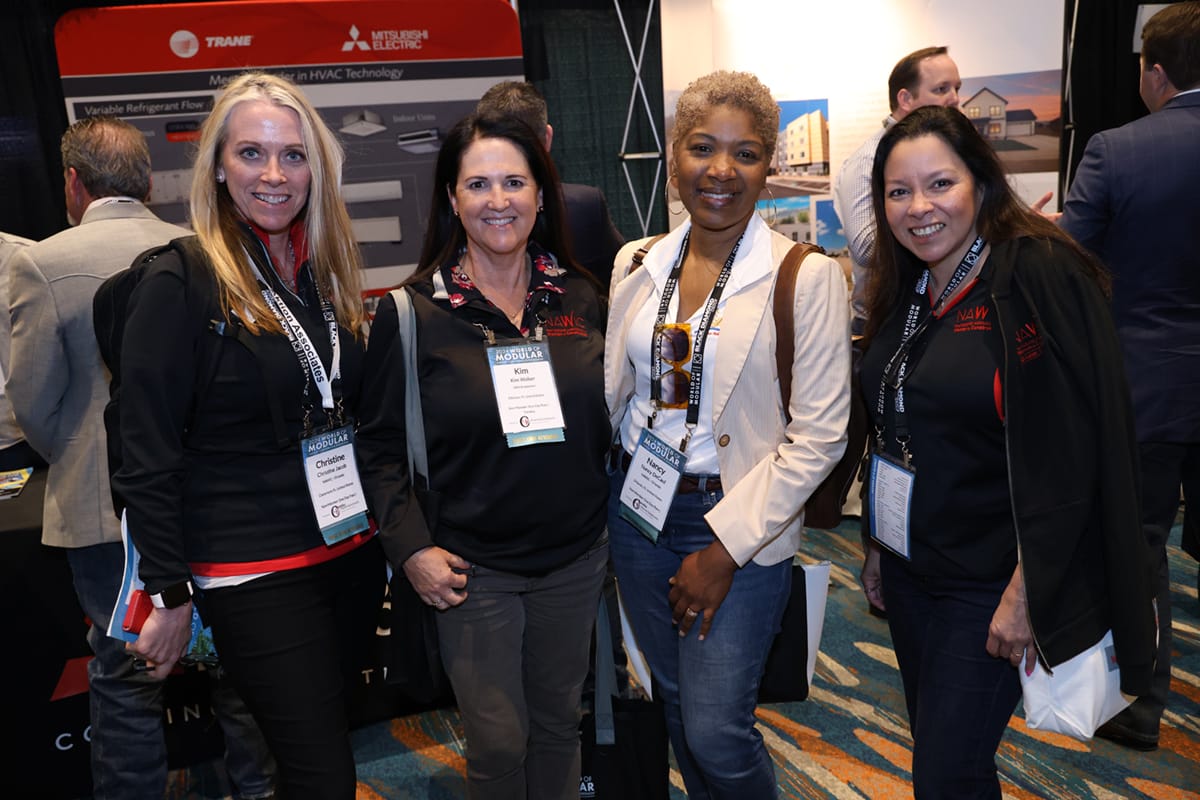
World of Modular offers the opportunity for attendees to get introduced, deepen relationships, and form new industry partnerships.
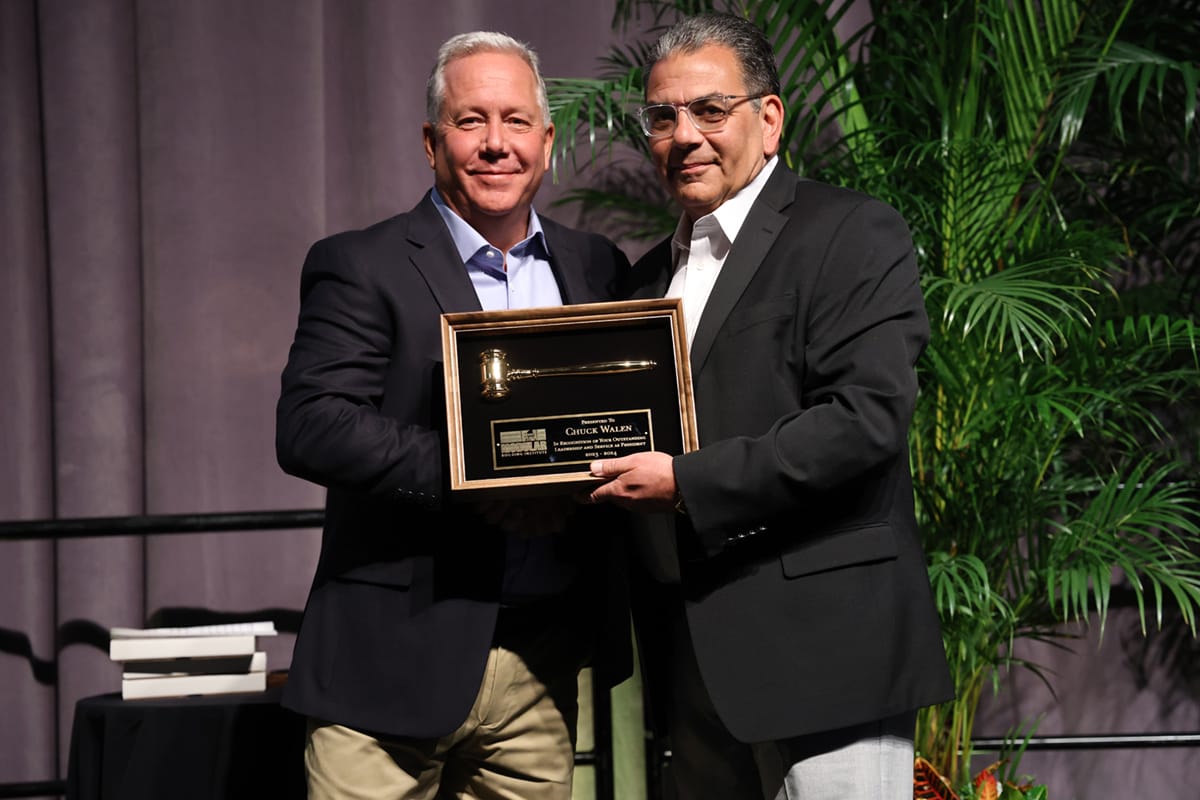
New MBI board president John Buongiorno (right) recognizes outgoing board president Chuck Walen for his service.
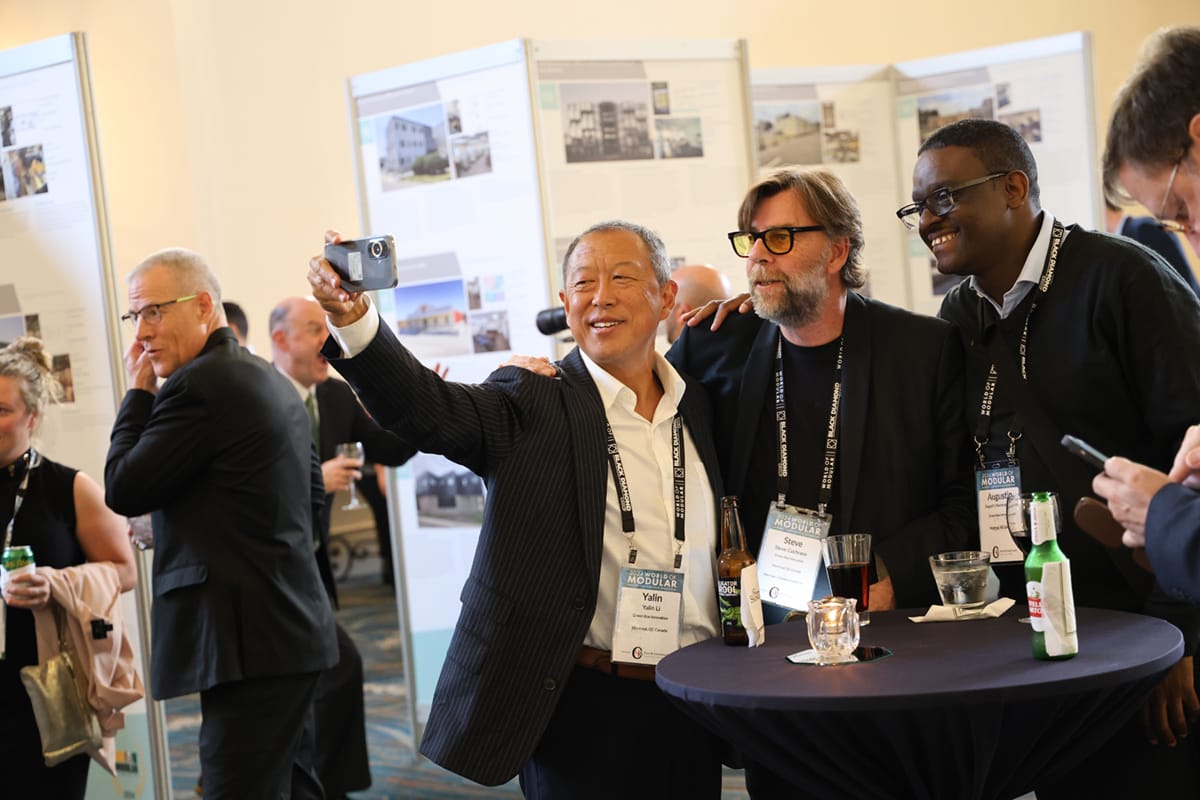
The VIP reception, held just prior to the Awards of Distinction banquet on the final day of the conference, offered attendees the chance to snap pictures and celebrate each other’s accomplishments.
More to Come in 2024 and 2025
Despite the success of the 2024 World of Modular, MBI is already hard at work preparing its next international event across the pond: World of Modular Europe, set for October 1-2, 2024 is set to bring MBI’s signature event to its international members in Brussels, Belgium. Following that will be next year’s annual US conference, to be held at the Bellagio Hotel & Resort in Las Vegas, NV, April 7-10, 2025.
About the Author: Dawn Killough is a freelance construction writer with over 25 years of experience working with construction companies, subcontractors and general contractors. Her published work can be found at dkilloughwriter.com.
More from Modular Advantage
AI, Faster Sets, and Automation: The Future of Modular is at World of Modular
While the modular building industry has long known that it can be an effective solution to increase affordable housing, the word is slowly spreading to more mainstream audiences. Three presentations at this year’s World of Modular in Las Vegas hope to provide insight and direction for those seeking a real solution to the crisis.
An Insider’s Guide to the 2025 World of Modular
The Modular Building Institute is bringing its global World of Modular (WOM) event back to Las Vegas, and with it comes some of the industry’s best opportunities for networking, business development, and education. Over the course of the conference’s four days, there will be numerous opportunities for attendees to connect, learn, and leverage event resources to get the most out of the conference.
Affordable Housing Now: The Industry’s Best Bring New Solutions to World of Modular
While the modular building industry has long known that it can be an effective solution to increase affordable housing, the word is slowly spreading to more mainstream audiences. Three presentations at this year’s World of Modular in Las Vegas hope to provide insight and direction for those seeking a real solution to the crisis.
Opportunities for Innovation in Modular Offsite Construction
Modular Offsite Construction has already shattered the myth that it only produces uninspired, box-like designs. Architectural innovations in module geometry, configurations, materials, and products make it possible to create visually stunning buildings without sacrificing functionality or efficiency.
Safe Modular Construction with Aerofilm Air Caster Transport
In collaboration with Aerofilm Systems, Heijmans developed innovative skids using air caster technology for moving modules easily and safely. These pallets are equipped with an auto-flow system, making operation extremely simple.
Miles, Modules, and Memes: Building a Modular Network One Flight at a Time
At the end of the day, social media is just another tool for building connections, and like any other tool, needs to be used skillfully to work properly. Use social media thoughtfully, and it will open doors to real opportunities and relationships you didn’t even see coming.
Falcon Structures: Thinking Inside the Box
Some of Falcon’s latest projects include creating container solutions for New York’s Central Park and an East Coast professional baseball team. More and more, Falcon is shipping out container bathrooms and locker rooms to improve traditionally difficult work environments, like those in oil and gas or construction.
UrbanBloc—From Passion to Industry Leader
UrbanBloc specializes in three main categories or markets – what they call “Phase 0” projects, amenities, and urban infill. Clients are often attracted to shipping containers because from a real estate perspective they are considered an asset. Having the flexibility to move and transport these assets allows owners to respond to different circumstances in a fluid manner that they can’t get with standard construction.
The Hospitality Game-Changer
“Hospitality is about more than just providing a service – it’s about delivering an experience,” says Anthony Halsch, CEO of ROXBOX. “And that’s where containers thrive. They allow us to create spaces that are unique, efficient, and sustainable.”
Container Conversions Counts on Simplicity to Provide Critical Solutions
Container Conversions has fabricated and developed thousands of containers for varied projects, including rental refrigeration options, offices, kitchens, temporary workplace housing, and mobile health clinics.










